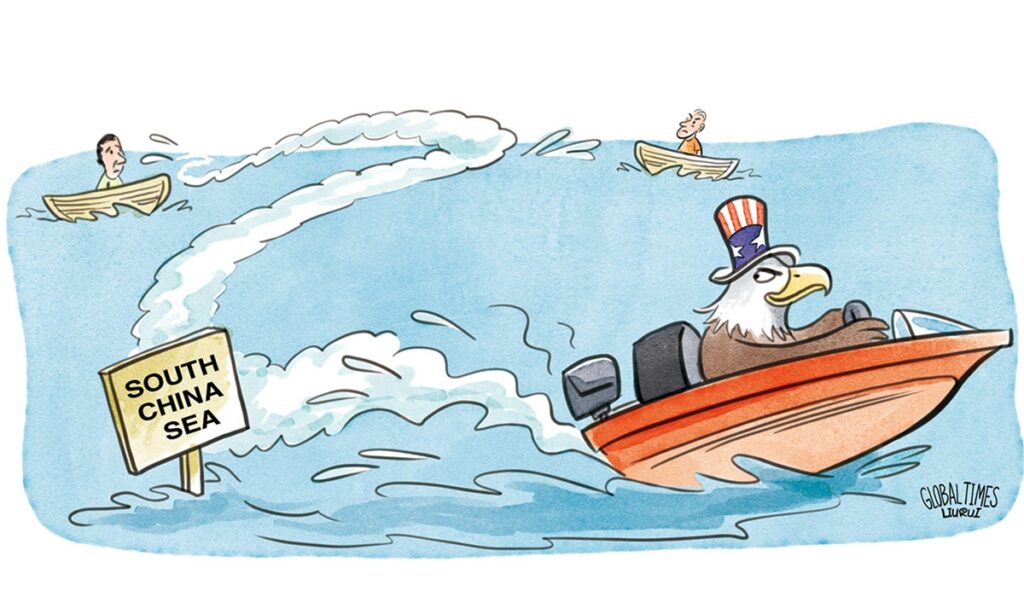The South and East China Seas are among China’s major security concerns in its neighborhood. Despite this, the US still hypes up competition with China in these regions to cover up the tendency of its hegemonic expansion.
The US Congressional Research Service (CRS) recently published a report which pointed out that the South China Sea in the past 10 to 15 years has become the arena of US-China strategic competition, while actions by China’s maritime forces at the Diaoyu Islands in the East China Sea are another concern for US observers. “Chinese domination of China’s near-seas region… could substantially affect US strategic, political, and economic interests in the Indo-Pacific region and elsewhere,” said the CRS report.
The South and East China Seas hold different strategic positions for China and the US. On one hand, as China’s military strength has rapidly progressed, the Chinese navy no longer prioritizes near-shore defense. Instead, it actively and comprehensively seeks to safeguard China’s sovereignty and security in these waters. China’s activities in the South and East China Seas are among the first indications of its rise as a global power.
On the other hand, the South and East China Seas are at the forefront of US hegemonic power. Despite being geographically distant from these waters, the US still perceives China’s near-seas region as a place to show off its military presence and political influence due to the pervasive nature of the US global hegemony. This situation is unlikely to change unless the US hegemonic strategy collapses.
It is evident that the situation in the South and East China Seas has become complicated over the years. Experts told the Global Times that Washington is the biggest driver of the intensifying China-US competition in these regions, noting the US deliberately creates problems in these regions for its own interests. In other words, the US aims to showcase the strength of its hegemony, while simultaneously containing China’s development through its Indo-Pacific Strategy.
Managing the China-US competition in those regions has become an urgent yet difficult task. When China’s growing determination to protect its national security encounters the US’ pursuit for global hegemony in the South and East China Seas, a collision can easily occur. The US will do anything to make sure its needs override China’s, leading to the emergence of more confrontations and future deterioration of bilateral relations.
The intense strategic competition between Beijing and Washington in China’s near-seas region may also affect policymaking in the US. The CRS is a major congressional think tank under the Library of Congress that serves members of Congress and their committees. Its recent report is obviously intended to clarify congressional responsibilities in the China-US strategic competition in the South and East China Seas, so that Congress can better help Washington gain an advantage over Beijing.
The US Congress has passed bills to institutionalize anti-China activities, which in itself will lead to further tensions in the bilateral relationship. This year, the South China Sea and East China Sea Sanctions Act of 2023 has already been introduced in the Senate; we cannot rule out the possibility that Congress may use more legislative resources against China’s development.
But from a strategic point of view, the US actually hopes China’s neighbors in the South and East China Seas to fight Beijing at the forefront, while the US provides strategic support from behind. The question is, as Washington’s sinister intentions of exploiting its allies and partners become increasingly prominent, how many countries will be willing to pay for US hegemonic strategy?
In the face of the US’ intense competition with China in China’s neighboring waters, China should, on one hand, strive for a more favorable international environment through diplomatic means to ensure a long-term peaceful and stable surrounding environment conducive to its development.
On the other hand, the country should not neglect the development of its hard power, including military capabilities. During critical moments, China must demonstrate its determination through action to safeguard national sovereignty, security, and interests, making it clear to those who provoke that there is no room for maneuver when it comes to issues involving China’s red line.
(Global Times)




